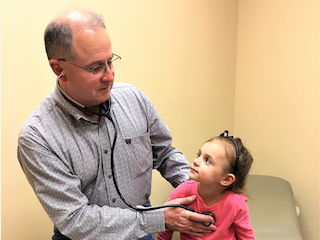fee-for-service model
See the following -
A New Kind of Doctor's Office Charges a Monthly Fee and Doesn't Take Insurance — and It Could Be the Future of Medicine
 Dr. Bryan Hill spent his career working as a pediatrician, teaching at a university, and working at a hospital. But in March 2016, he decided he no longer wanted a boss. He took some time off, then one day he got a call asking if he'd be up for doing a house call for a woman whose son was sick. He agreed, and by the end of that visit, he realized he wanted to treat patients without dealing with any of the insurance requirements. Then he learned about a totally different way to run a doctor's office...
Dr. Bryan Hill spent his career working as a pediatrician, teaching at a university, and working at a hospital. But in March 2016, he decided he no longer wanted a boss. He took some time off, then one day he got a call asking if he'd be up for doing a house call for a woman whose son was sick. He agreed, and by the end of that visit, he realized he wanted to treat patients without dealing with any of the insurance requirements. Then he learned about a totally different way to run a doctor's office...
- Login to post comments
How Did Health Care Get to Be Such a Mess?
The problem with American health care is not the care. It’s the insurance. Both parties have stumbled to enact comprehensive health care reform because they insist on patching up a rickety, malfunctioning model. The insurance company model drives up prices and fragments care. Rather than rejecting this jerry-built structure, the Democrats’ Obamacare legislation simply added a cracked support beam or two. The Republican bill will knock those out to focus on spackling other dilapidated parts of the system...
- Login to post comments
Many Healthcare Technologies Are Married to the Fee-for-Service Model
 Monday’s 5 p.m. digital health panel at the J.P. Morgan Healthcare Conference happened to coincide with a presentation given by the popular U.S. Vice President Joe Biden. Some attendees were torn. For those that did make it, panel moderator Bob Kocher promised some topical debates far more interesting than that “moon-thing” Biden has been up to. It was all of the fun, without the metal detectors. A partner at Venrock Ventures, Bob Kocher set the stage with some fundamental observations about how technology can help enhance healthcare for all stakeholders...
Monday’s 5 p.m. digital health panel at the J.P. Morgan Healthcare Conference happened to coincide with a presentation given by the popular U.S. Vice President Joe Biden. Some attendees were torn. For those that did make it, panel moderator Bob Kocher promised some topical debates far more interesting than that “moon-thing” Biden has been up to. It was all of the fun, without the metal detectors. A partner at Venrock Ventures, Bob Kocher set the stage with some fundamental observations about how technology can help enhance healthcare for all stakeholders...
- Login to post comments
Public Health Tech: The Future of Health Tech You Never Heard Of
Digital Health has experienced a glorious boom in the last decade and is expected to reach $379.3 Billion by 2024 with 25% of the growth occurring between 2016 and 2024. Patient management can now be done on user-friendly platforms; physicians can remotely monitor their patients with mobile devices and telemedicine; and personal trackers and genetic testing are allowing patients easier access to their own health data. Clearly, we understand the kind of power technology has on improving the delivery of care and management of disease...
- Login to post comments